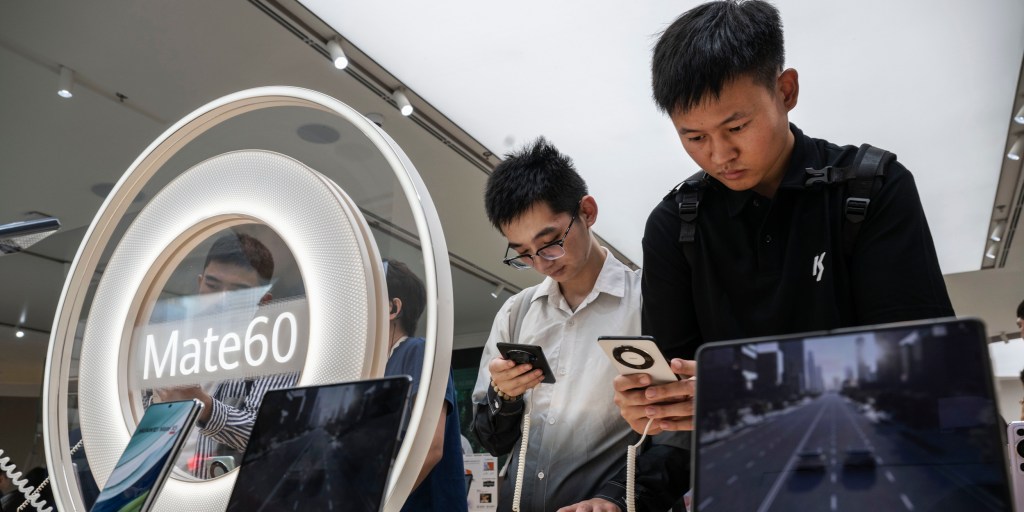Chinese tech giant Huawei is reportedly building secret semiconductor-fabrication facilities in China to evade U.S. sanctions, according to the Semiconductor Industry Association, which claims that Huawei has acquired existing plants and is constructing three others using state funding.
Chinese chip stocks rally after Huawei's launch of the Mate 60 Pro phone, with investors speculating that it could be using a 5G capable chip, potentially benefitting China's local semiconductor sector.
Huawei and China's top chipmaker SMIC have developed an advanced 7-nanometer processor for the new Huawei Mate 60 Pro smartphone, marking progress in China's domestic chip ecosystem and a challenge to U.S. restrictions on Huawei's access to chipmaking tools.
The launch of Huawei's new smartphone raises questions about global technology and control of the future, as the Chinese company unveils a smartphone powered by an advanced chip, potentially challenging US efforts to block China from acquiring cutting-edge computer chips.
China has defied US-led export restrictions by producing a 5G smartphone, Huawei's Mate 60 Pro, using an advanced silicon chip made by Semiconductor Manufacturing International Corp (SMIC), indicating progress in China's efforts to build a domestic chip ecosystem.
China's Huawei Technologies' development of an advanced chip for its latest smartphone demonstrates the country's determination to fight back against U.S. sanctions, but the efforts are costly and may lead to tighter restrictions from Washington, according to analysts.
Huawei's Mate 60 Pro is making a comeback in the Chinese smartphone market, but analysts believe its chances of competing with Apple and Samsung globally are slim due to the lack of popular apps like Google Maps and the impact of US sanctions.
The US government is seeking more information about the Huawei Mate 60 Pro smartphone, particularly its advanced chip, to determine if American restrictions on semiconductor exports were bypassed.
The recent unveiling of Huawei's Mate 60 Pro smartphone, powered by the Kirin 9000s chip, has sparked debates about its significance in the US-China technology cold war.
Huawei has announced the 5G Mate 60 smartphone, defying US sanctions and showcasing China's advances in semiconductor design, potentially allowing the brand to regain its position in the best camera phone rankings by 2023.
Huawei's Mate 60 Pro contains memory chips from SK Hynix, raising questions about how the chips ended up in the device and whether any laws were violated.
The U.S. government is investigating how Huawei and SMIC managed to create 7nm Kirin 9000S 5G chipsets in violation of American sanctions, while Foxconn workers assembling the Huawei Mate 60 Pro in China are paid 19.2% more than those assembling the iPhone.
Huawei's chip design unit, HiSilicon, is shipping new Chinese-made chips for surveillance cameras, indicating that the company is finding ways around the US export controls and reclaiming market share in the sector.
Despite conflicting claims, the U.S. Commerce Secretary has stated that there is no evidence that Huawei can manufacture smartphones with advanced semiconductors at scale.
Chinese telecommunications giant Huawei focused on launching new electric cars and wireless earbuds, without revealing any details about its new phone or advanced chip breakthrough, during its high-profile launch event, leaving many disappointed.
Huawei unveiled several new products, including a tablet, smart TV, and ear pods, but remained silent on its breakthrough Mate 60 Pro smartphone powered by a home-grown chip, seen as a significant step toward China's tech self-sufficiency.
Huawei disappoints fans and US officials at a recent product launch event by not discussing its flagship Mate 60 Pro smartphone, raising further concerns and calls for sanctions against the Chinese tech giant.
The Huawei Mate 60 RS is a high-end smartphone with a powerful camera, long battery life, and satellite call capabilities, available in China with 16 GB of RAM and 512 GB or 1 TB of storage.
Reports of Huawei’s new 5G phone using an advanced, China-made chip are highly concerning to U.S. Commerce Secretary Gina Raimondo, raising questions about how Huawei may be bypassing U.S. controls and the potential implications for national security.
Huawei is stockpiling components in order to double its smartphone sales in 2024, despite expectations of a further U.S. crackdown.
The mystery behind the Kirin 9000s chipset used in the Huawei Mate 60 Pro has potentially been solved by a tipster, suggesting that it is actually a rebranded 5nm Kirin 9000 chip made by TSMC three years ago, not SMIC, as previously believed.
The release of Huawei's Mate 60 Pro and a decline in iPhone sales in China have allowed Huawei to surpass Apple as the top-selling smartphone brand in the country, with analysts predicting that iPhone shipments will continue to decrease due to weak demand.
The smartphone market is showing signs of recovery, with only a 1% decline in Q3 2023, but vendors should remain cautious due to geopolitical uncertainties and ongoing adjustments in sales channels and component inventories, according to a report by Canalys. Samsung maintained its position as the market leader, followed by Apple, while Xiaomi and Transsion experienced success in emerging markets. Huawei also made a strong comeback with the release of the Mate 60 series, although its availability is currently limited to China.
Huawei has sold 1.6 million of its Mate 60 Pro smartphones in six weeks, defying smartphone slowdown and enjoying strong demand in its high-end smartphone renaissance.
Huawei has sold 1.6 million of its Mate 60 Pro handsets in six weeks, defying the smartphone slowdown and enjoying strong demand amidst the launch of the iPhone 15, according to Counterpoint Research.
